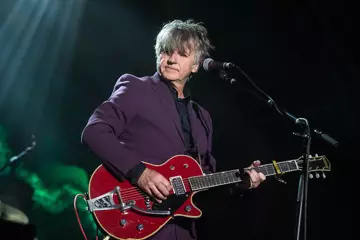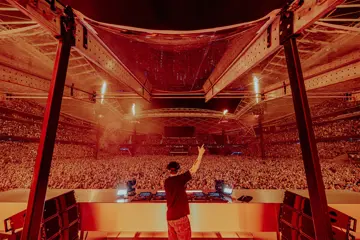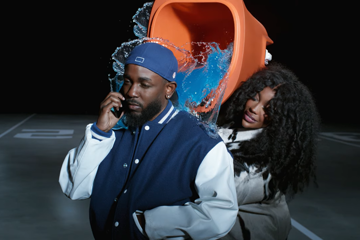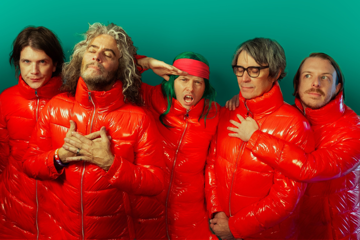It's July 4 in San Francisco, America's day of celebration and a day commemorating the country's declaration of independence. It's an apt time to be calling Jon Porras of Barn Owl, a fiercely independent doom duo from California creating music solely on their own terms. Porras is celebrating with close friends on a rooftop balcony, surrounded by sunshine, barbecue and beers.
Porras and his lone Barn Owl bandmate Evan Caminiti met as students studying American Indian science at San Francisco State University in 2005 and bonded over a love of heavy metal. As the friendship developed it became apparent their musical similarities extended to meditative and psychedelic sounds. While the subject they were studying was immersed in ritualised and ceremonious acts, Porras refuses to be drawn on it playing an influence on the Barn Owl sound. “I think any sort of tribal sound that you might hear from Barn Owl's music comes from using a pentatonic scale, which is what a lot of Indigenous American cultures use in their own music practice,” he says, “but I think that was just a coincidence. I want to be very careful about appropriating American Indian music, because I feel that that is something very specific and what Evan and I do is something different from that and more related to contemporary experimental music.”
Experimental music is not only the easiest way to describe the eclectic and ever evolving Barn Owl sound, but the best. A sound which people have described as minimal techno, horror soundtrack, droning desert blues and more recently doom dub. “People have been tossing around this term 'doom dub'. A lot of dub musicians will take a live recording and use it as an artefact, process it and reconceptualise it as a recording. In dub culture the lines between producer and artist are blurred. So for the new record Evan and I took the live recordings that we tracked in the studio and brought them to our home studio and did a ton of editing, a ton of processing and used a lot of the techniques that some of our favourite dub producers use. We also wanted to throw in some of the darker tones and texture that Barn Owl has also used, like the melancholy and darker elements. We wanted to include that with the dub process, so I think that is where the term came from.”
The band's sound and instrumentation has developed on each of their five records and it isn't surprising given the depth of their influences. “Initially when Barn Owl first started we were very influenced by American minimalists, so people like Terry Riley, La Monte Young and Steve Reich. Evan and I really connected over music like that when we first started playing together so that was common ground. We were also very interested in the finger stylings of John Fahey, Robbie Basho, Leo Kottke and a few other solo guitarists. So when we initially started I guess we united those two worlds of minimal classical music and primitive acoustic guitar.”
Don't miss a beat with our FREE daily newsletter
Along with sharing close influences with his musical collaborator and long-term friend, Porras says there are many perks of performing in a duo. Having previously played in bands and with a successful solo project on the side, he admits performing as a pair is his favourite formation. “I really like the duo dynamic. I think something special happens between the chemistry that Evan and I have and I think there's something really special about being able to sit down, compare notes and dive into some composition. There's the logistical side of being in a duo that makes it easier, but creatively it's also very helpful to have another person to bounce ideas off and I think we're really productive within that setting.”
Earlier this year the duo completed a successful tour of Europe, including shows and festivals in Luxembourg, Switzerland, Germany, Belgium, France and Italy. Given they were playing instrumental music in non-English speaking countries, the typical language barriers were seemingly nonexistent. “I never thought about that, but I think because our music is instrumental there isn't that language barrier, so the music has the opportunity to speak on its own through tones, textures and volume.”
With no lyrics and often vague song titles, Porras is more than happy to let listeners draw their own conclusions to song meanings. “They come from a variety of places,” he says of song titles Procession Of Golden Bones, Lotus Cloud and Blood Echo. “Sometimes they are ideas we have cooked up on our own and bring to the studio, but sometimes they're very specific to ideas and feelings that we put forth into the music. We want to be very careful about not clearly defining to the listener what type of images a certain song should conjure up. We want to leave it open-ended and let the listener create whatever imagery they want.”
Touring Australia for the first time in August, Barn Owl's set will be driven by synthesisers, a stark contrast to the looped guitar sounds that trademarked their early recordings “It's all going to be synthesisers,” Porras reveals. “Evan and I are both playing analogue synthesisers. It's interesting, because on our last European tour there were some people who were apprehensive and weren't happy with the idea that we were changing instrumentation, but after we played they were pleasantly surprised. With a guitar, you're limited as far as frequency range. With synths we can get a lot more interesting low-end happening, a lot more treble. Our range and our capabilities as far as musicians have grown exponentially with the use of synthesisers, so I hope that people will respond positively to that.”
Creating a hypnotic groove through layered electronic sounds, Porras admits it's a constant challenge to not slip into a mediative state when performing live and to an audience. “To some degree I want to let myself go and I want there to be a flow between my creativity and my technical skill. But at the same time I want to be fully aware of where I'm at and want to be fully conscious of what Evan is playing and respond to that. So I think there's a balance between a meditative state in which you let your mind wander and then the extreme concentration. It's the balance of those two mentalities that I really benefit from in a performance environment.”
So what can Australian fans expect on the impending tour? “We'll play for an hour long. We like to do a solid block of music and we don't stop between songs.” Staunch, uncompromising and independent; just the way they like it.















